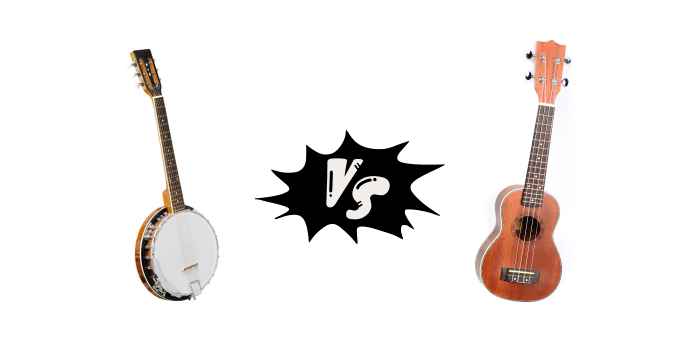So, you’ve made up your mind to learn a musical instrument but don’t know what to choose? Don’t worry! In this article, I’ll discuss banjo vs. ukulele: Which is better for you to play?
As someone who has strummed and picked their way through both, I’m excited to help you navigate this melodious dilemma. So, stay connected to learn more.
The Difference Between a Banjo and Ukulele

The difference between a classic banjo and a playful ukulele is, for sure, the most important thing to help you choose the best one. So, without any delay, let’s start which will suit you better.
1. Sound and Tone
When it comes to sound, the banjo and ukulele offer different rhythms. With its distinctive twang and rich resonance, the banjo conjures images of Southern porch jams and folk tunes. Its metallic strings and unique drum-like body create a vibrant, toe-tapping sound that’s impossible to ignore.
On the other hand, the ukulele, with its sweet, gentle strumming, gives the feeling of dancing on a Hawaiian beach. It has a warm and melodic tone that’s impossible to ignore.
2. Learning Curve
Now, let’s talk about the learning curve. Both instruments have their quirks, but you can master them with practice. With its fewer strings and simpler chord patterns, the ukulele is often considered a fantastic choice for beginners.
The banjo, on the other hand, is slightly more challenging but offers a rewarding experience for those willing to practice. Its unique playing style and fingerpicking techniques might take a bit more time, but the satisfaction of learning it is worth it.
3. Versatility of Styles
Each instrument has its distinct features that no other instrument can fulfil. Both the banjo and ukulele also have their own style and features. The banjo shines in folk, bluegrass, and country genres, adding a lively flair to traditional tunes. It can also hold its own in modern music, bringing a unique texture to rock and even jazz.
Meanwhile, the ukulele’s cheerful disposition makes it a perfect companion for pop, indie, and island-inspired melodies. Its compact size makes it an ideal instrument for intimate gatherings and solo performances.
4. Portability and Size
Speaking of size, this is where the ukulele really stands out. Its compact and lightweight design makes it easier to carry around. Toss it into a backpack, take it to the beach or a campfire – the ukulele is always a favourite in jam sessions.
However, the banjo, with its larger frame and bulkier build, might require a bit more planning before you take it on your adventures.
5. Cost and Accessibility
Now it’s time to discuss the most crucial topic. The banjo and ukulele come in various price points, which makes them accessible to musicians of all budgets. You can find affordable beginner options that still deliver quality sound.
However, remember that intricate designs, higher-quality materials, and brand reputation can influence the price. It’s a good idea to try out a few different models within your budget to find the best one. Remember, the investment you make in your musical journey is an investment in yourself.
Conclusion
So, here we end our debate on Banjo vs. Ukulele. But if you are looking for a clear winner, there’s none. It is all about your preference and the choice you make. But if you are new in the musical world and starting your hand at stringed instruments, the ukulele is easier to learn than a banjo.
However, I can say in this war of “banjo vs. ukulele, which is better for you to play,” it depends on what instrument you want to learn.
FAQs
Absolutely! While there might be a learning curve, both instruments are approachable for beginners.
The ukulele comes first in portability. It has a compact size, which is excellent as a travel companion.
Yes, indeed! Electric versions of both instruments are available.
The banjo’s versatility knows no bounds. It can add a unique twist to modern songs across various genres, giving them an unexpected and delightful flavour.